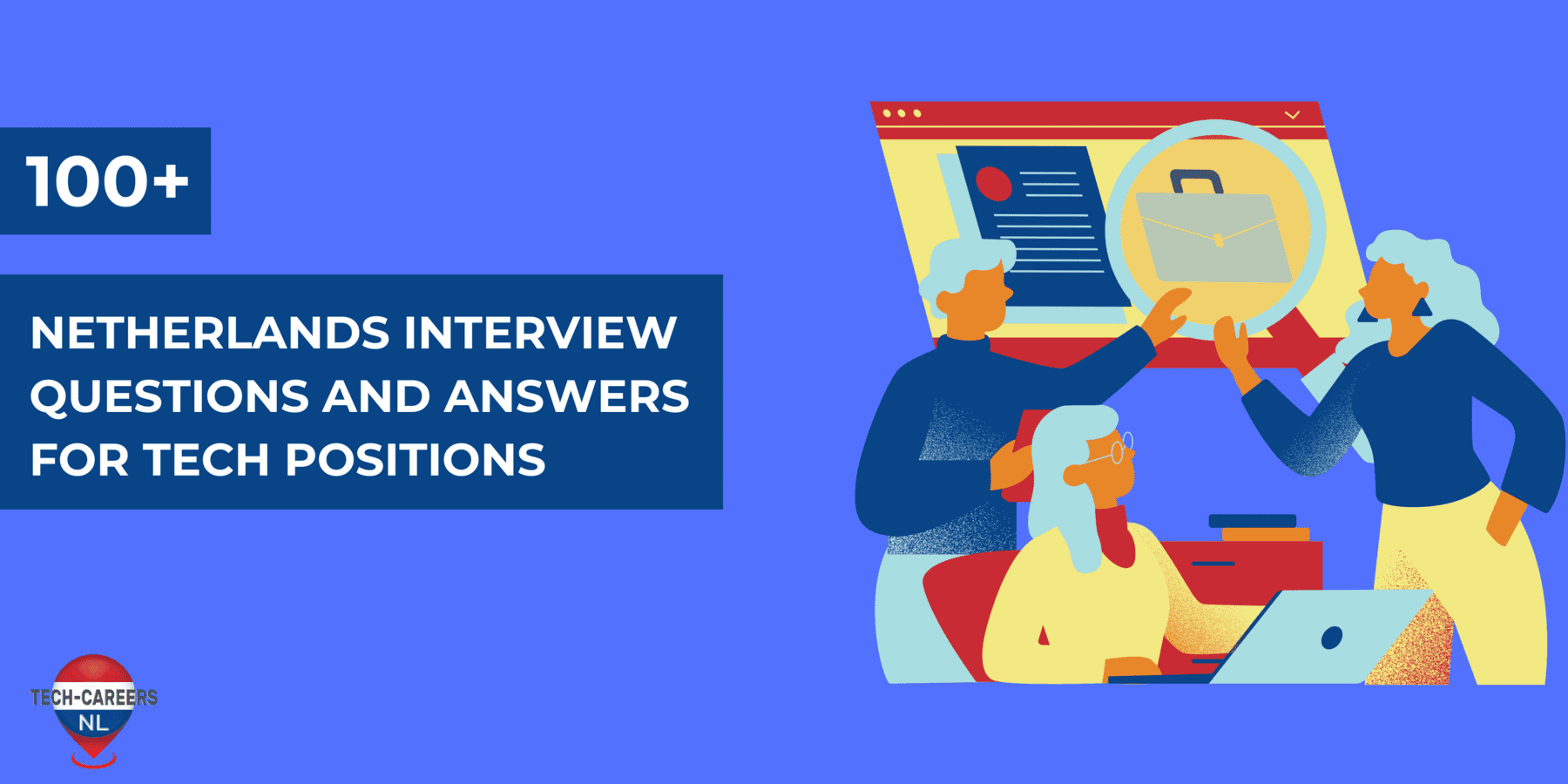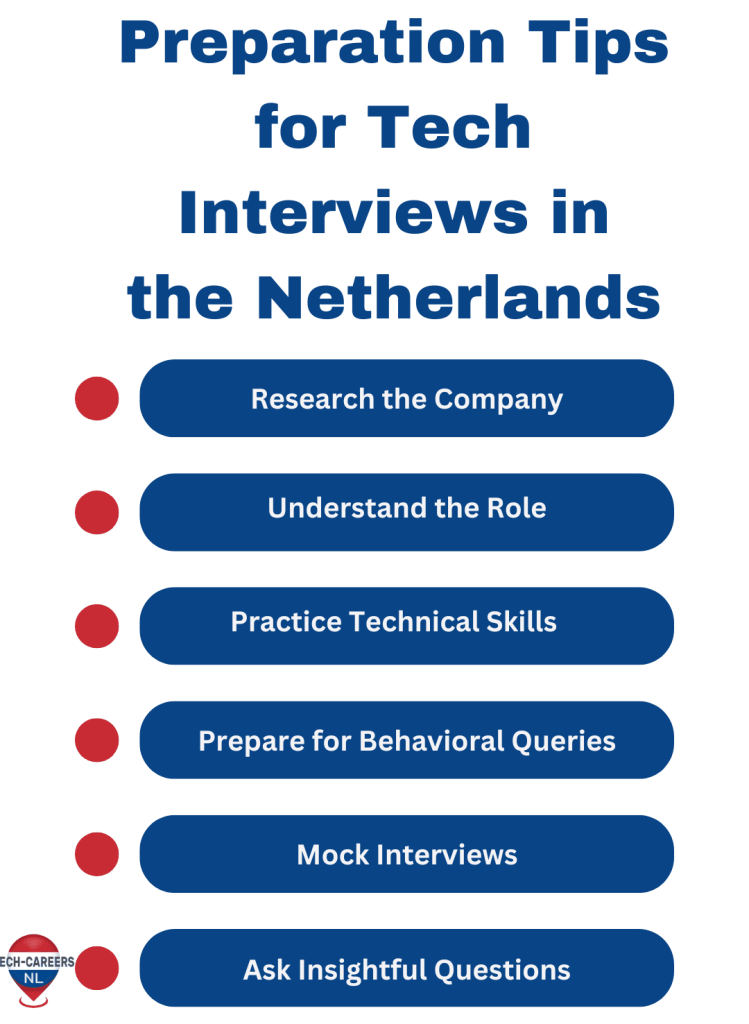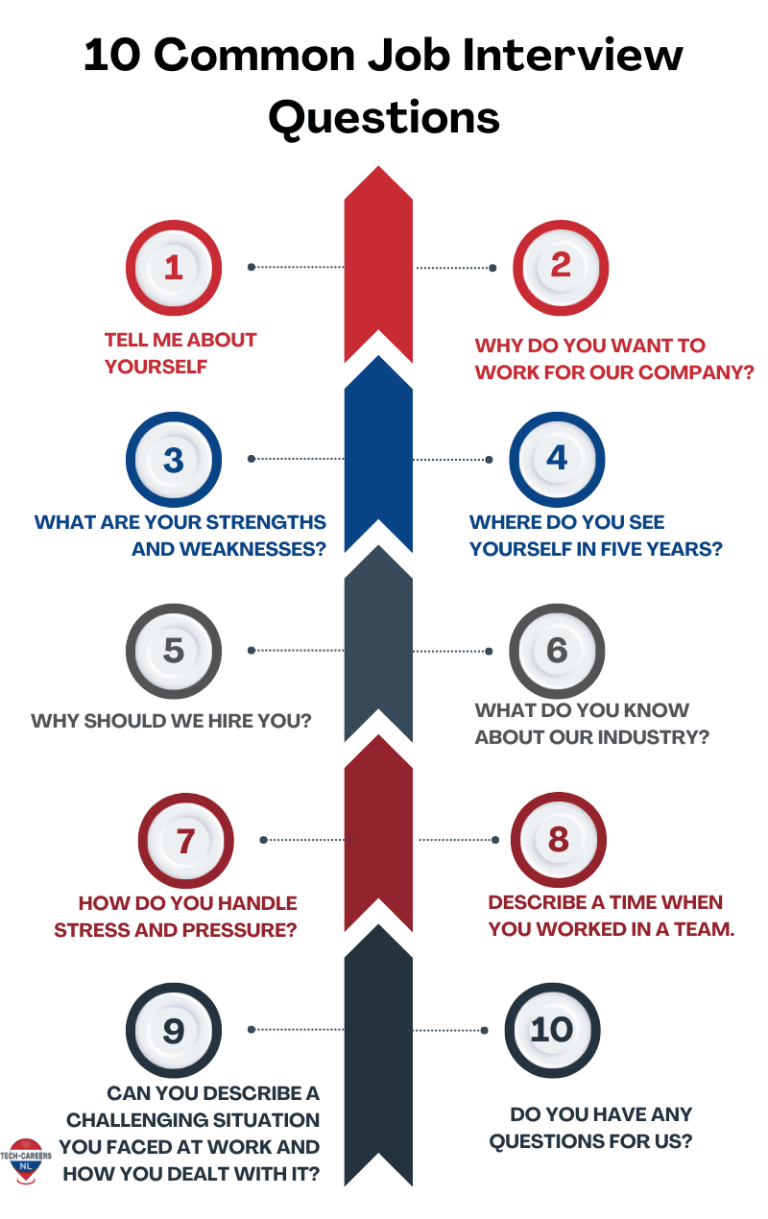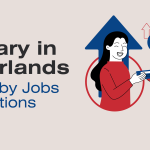
Tech interviews in the Netherlands are crucial for securing positions in the country’s vibrant tech industry. Given the Netherlands’ reputation as a tech hub, the employment discussion process is rigorous and comprehensive. It typically includes initial screening, technical assessments, behavioral interviews, and on-site conversations, each designed to evaluate various aspects of a candidate’s fit and skills.
The significance of these employment discussions extends beyond assessing technical abilities. They are essential for determining cultural fit, verifying skill proficiency, and enhancing career advancement prospects. Dutch companies prioritize cultural fit to ensure seamless integration into their collaborative and innovative work environments. Tech employment discussions also confirm that candidates can effectively perform the required tasks.
An important consideration for candidates is the IT salary in Netherlands. The remuneration is competitive, reflecting the high demand for skilled tech professionals. Entry-level positions offer annual salaries ranging from €35,000 to €50,000, mid-level positions between €50,000 and €70,000, and senior-level roles can exceed €80,000, with top-tier positions offering even higher packages.
Understanding the structure and significance of the Netherlands interview questions, along with the potential IT salary, helps candidates prepare better and align their expectations with industry standards, essential for navigating the competitive Dutch tech job market.
Preparation Tips for Tech Interviews in the Netherlands
When preparing for tech interviews in the Netherlands, it’s essential to be well-prepared, confident, and familiar with both technical and behavioral queries. Here’s a guide to help you navigate the process successfully:
Research the Company
Start by researching the company thoroughly. Understand their products, services, culture, and recent news. This knowledge will not only help you tailor your answers but also show the interviewers that you are genuinely interested in their organization. Knowing the company’s background can also help you prepare for common questions for a job interview.
Understand the Role
Make sure you have a clear understanding of the job description and the required skills. This will help you anticipate the best job interview questions related to the role. Be prepared to discuss your previous experiences and how they align with the job requirements. Highlight specific projects or achievements that demonstrate your suitability for the position.
Practice Technical Skills
Technical interviews in the Netherlands often include coding tests, algorithm queries, and problem-solving exercises. Practice coding challenges on platforms like LeetCode, HackerRank, and CodeSignal. Brush up on data structures, algorithms, and system design principles. The more you practice, the more confident you will be during the actual employment discussion.
Prepare for Behavioral Queries
Behavioral queries are a significant part of tech employment discussions. Be ready to answer why you want to work for the company and why you want to relocate to the Netherlands. Common why do you want to work in Netherlands interview questions might include:
- What attracts you to the Dutch work culture?
- How do you see yourself contributing to our team in the Netherlands?
- What are your long-term career goals, and how does this position fit into them?
Mock Interviews
Conduct mock employment discussions with friends or use online services to simulate the interview experience. This practice will help you get comfortable with the interview format and improve your communication skills. Pay attention to both technical and behavioral aspects during these mock sessions.

Ask Insightful Questions
At the end of the employment discussion, you will often have the chance to ask your own questions. Prepare thoughtful and insightful queries for a job interview that reflect your interest in the role and the company. Some examples include:
- Can you tell me more about the team I will be working with?
- What are the biggest challenges the company is currently facing
- How does the company support professional development and growth?
Final Tips
- Dress appropriately for the employment discussion, even if it is virtual.
- Ensure you have a reliable internet connection and a quiet environment for online conversations.
- Follow up with a thank-you email after the employment discussion, reiterating your interest in the position and appreciation for the opportunity.
By following these tips, you will be well-prepared to tackle your tech interview in the Netherlands confidently and effectively
General Sample Job Interview Questions
Preparing for a job interview involves anticipating the queries you might be asked and formulating thoughtful responses. Here are some general sample job interview questions you may encounter, along with tips on answering them effectively.
10 Common Job Interview Questions
Tell me about yourself.
- This question is often used as an icebreaker. Focus on your professional background, key achievements, and what makes you a great fit for the role.
Why do you want to work for our company?
- Demonstrate your knowledge about the company and align your career goals with the company’s mission and values. Highlight why the company’s culture and projects appeal to you.
What are your strengths and weaknesses?
- Choose strengths that are relevant to the job and provide examples. When discussing weaknesses, be honest but also talk about how you are working to improve them.
Can you describe a challenging situation you faced at work and how you dealt with it?
- Use the STAR method (Situation, Task, Action, Result) to structure your answer. Focus on what you learned from the experience and how it has prepared you for future challenges.
Where do you see yourself in five years?
- Show ambition and align your career aspirations with the growth opportunities at the company. Highlight how this position will help you achieve your long-term goals.

Why should we hire you?
- Summarize your skills, experiences, and how they meet the job requirements. Emphasize your unique qualities that make you stand out from other candidates.
What do you know about our industry?
- Demonstrate your understanding of the industry trends, challenges, and opportunities. Show that you are well-informed and genuinely interested in the field.
How do you handle stress and pressure?
- Provide examples of how you manage stress through organization, prioritization, and maintaining a positive attitude. Mention any specific techniques you use to stay calm under pressure.
Describe a time when you worked in a team.
- Highlight your ability to collaborate, communicate, and contribute to a team’s success. Provide an example that shows your teamwork skills and the positive outcome of the collaboration.
Do you have any questions for us?
- What are the key challenges facing the team right now?
- How is success measured in this role?
- Can you tell me about opportunities for professional development?
- Always have a few questions prepared to show your interest in the role and the company.
By preparing for these best job interview questions, you can approach your interview with confidence. Tailor your responses to reflect your experiences and how they align with the job you’re applying for, and remember to be concise, honest, and positive throughout the interview process.
Role-Specific Tech Interview Questions and Answers
When interviewing for specific IT positions, it’s crucial to prepare for questions that directly relate to the role’s responsibilities and required skills. Here are some common role-specific tech employment discussion questions and answers for different IT positions, including those for tech leads and Java tech leads.
Can you describe a time when you had to lead a team through a difficult project?
- In my previous role, we faced a tight deadline for a project with complex requirements. I organized daily stand-ups to track progress, delegated tasks based on team members’ strengths and maintained open communication with stakeholders. We used agile methodologies to stay flexible and made data-driven decisions to ensure timely delivery. The project was completed on schedule and exceeded client expectations.
How do you ensure code quality and adherence to best practices in your team?
- I implement regular code reviews and use automated testing tools to maintain high code quality. I also encourage pair programming and provide training sessions on best practices. By fostering a culture of continuous improvement and learning, we can consistently deliver robust and maintainable code.
How do you handle conflicts within your team?
- I address conflicts by first understanding each team member’s perspective. I facilitate open discussions to identify the root cause and work towards a collaborative solution. By promoting a respectful and inclusive environment, I ensure that conflicts are resolved constructively and do not hinder the team’s productivity.
How do you optimize the performance of a Java application?
- To optimize a Java application, I start by profiling the application to identify bottlenecks. I then focus on optimizing algorithms and data structures, reducing memory usage, and enhancing concurrency where appropriate. Additionally, I review the use of JVM options and garbage collection settings to improve performance. Regular performance testing and monitoring are also critical to maintaining optimal application performance.
Can you explain your approach to designing scalable and maintainable Java applications?
- My approach involves adhering to SOLID principles and design patterns to create modular and reusable code. I prioritize the separation of concerns and use dependency injection to manage dependencies. For scalability, I design applications to be stateless wherever possible and leverage microservices architecture. Ensuring thorough documentation and comprehensive unit testing are also key practices to maintain the application over time.
How do you stay current with the latest developments in Java and related technologies?
- I stay updated by following reputable tech blogs, participating in online forums, and attending conferences and webinars. I also contribute to open-source projects and engage with the Java community through platforms like GitHub and Stack Overflow. Continuous learning and experimentation with new technologies and frameworks help me stay ahead in the ever-evolving tech landscape.
Can you describe your experience with agile development methodologies?
- I have extensive experience working in agile environments, particularly with Scrum and Kanban. I participate in sprint planning, daily stand-ups, sprint reviews, and retrospectives. Agile methodologies help me to collaborate effectively with cross-functional teams, respond to changes quickly, and continuously deliver value to the customer.
How do you approach debugging and troubleshooting issues in your code?
- I start by reproducing the issue and isolating the problematic code. I use debugging tools and logging to gain insights into the application’s behavior. By breaking down the problem and testing potential solutions incrementally, I can efficiently identify and resolve issues. Additionally, I write unit tests to prevent similar issues in the future.
What is your experience with version control systems, particularly Git?
- I have a strong background in using Git for version control. I am proficient in branching and merging strategies, resolving conflicts, and using tools like GitHub and GitLab for collaboration. I follow best practices such as committing frequently, writing clear commit messages, and conducting code reviews to ensure a smooth and efficient workflow.
How do you automate deployment processes?
- I use CI/CD pipelines to automate deployment processes. Tools like Jenkins, GitLab CI, and CircleCI help streamline the build, test, and deployment phases. I also employ infrastructure-as-code tools like Terraform and Ansible to automate infrastructure provisioning. Automation reduces errors, speeds up deployments, and ensures consistency across environments.
Can you describe your experience with containerization and orchestration?
- I have extensive experience with Docker for containerization and Kubernetes for orchestration. I use Docker to create, manage, and deploy containers, ensuring that applications run consistently across different environments. Kubernetes helps me manage containerized applications at scale, providing features like automatic scaling, self-healing, and load balancing.
How do you ensure the security of your CI/CD pipeline?
- I implement security best practices such as code scanning, dependency checking, and secret management. I use tools like SonarQube, Snyk, and HashiCorp Vault to identify vulnerabilities and secure sensitive data. Additionally, I enforce access controls and monitor pipeline activities to detect and respond to potential threats.
Can you describe your design process?
- My design process starts with understanding the user and the problem space through research and user interviews. I then create personas, user journeys, and wireframes. After that, I develop prototypes and conduct usability testing to gather feedback. I iterate on the design based on feedback and collaborate closely with developers to ensure a seamless implementation.
How do you stay current with design trends and user experience best practices?
- I regularly read design blogs, attend webinars, and participate in design communities like Dribbble and Behance. I also take online courses to learn new tools and techniques. Keeping an eye on industry leaders and case studies helps me stay inspired and informed about the latest trends and best practices.
Can you give an example of a project where your design significantly improved user engagement?
- In a recent project, I redesigned the onboarding process for a mobile app. By simplifying the steps and making the interface more intuitive, we reduced the drop-off rate by 40% and increased user engagement by 25%. User feedback highlighted the new design’s clarity and ease of use, which directly contributed to these improvements.
How do you design a scalable and secure cloud architecture?
- I start by understanding the requirements and constraints of the project. For scalability, I use auto-scaling groups, load balancers, and microservices architecture. For security, I implement best practices such as network segmentation, encryption, identity and access management (IAM), and regular security assessments. Ensuring compliance with relevant regulations is also a key part of the design process.
What experience do you have with different cloud providers?
- I have extensive experience with AWS, Azure, and Google Cloud Platform (GCP). I have designed and implemented solutions using services like EC2, S3, RDS, and Lambda on AWS; Virtual Machines, Blob Storage, and Azure Functions on Azure; and Compute Engine, Cloud Storage, and App Engine on GCP. I am familiar with the strengths and limitations of each provider and can choose the best one based on the project requirements.
How do you ensure cost efficiency in cloud solutions?
- To ensure cost efficiency, I use cost management tools provided by cloud providers to monitor and analyze spending. I optimize resource usage by rightsizing instances, using reserved instances, and leveraging spot instances. Implementing automation for scaling and turning off unused resources also helps in reducing costs. Regularly reviewing the architecture and usage patterns allows for continuous optimization.
How do you manage and prioritize support tickets?
- I use a ticketing system to categorize and prioritize tickets based on urgency and impact. I implement SLAs to ensure timely responses and resolutions. By analyzing ticket trends, I can identify recurring issues and address root causes. Effective communication with the team and stakeholders ensures that high-priority issues are handled promptly.
How do you handle a situation where a critical system goes down?
- In the event of a critical system outage, I first ensure that the team follows the incident response plan. We quickly assess the situation, communicate with affected stakeholders, and work to restore service as soon as possible. Post-incident, we conduct a root cause analysis and implement measures to prevent recurrence. Keeping detailed documentation and maintaining clear communication throughout the process is crucial.
Can you describe your experience with IT support team management?
- I have managed IT support teams by setting clear goals, providing regular training, and fostering a collaborative environment. I conduct performance reviews, provide feedback, and encourage professional development. By implementing best practices and leveraging the right tools, I ensure the team operates efficiently and delivers high-quality support to users.
By preparing for these role-specific questions, you can showcase your technical expertise and leadership skills, whether you’re aiming for a tech lead, Java tech lead, software engineer, or DevOps engineer position. Highlighting your relevant experiences and staying updated with the latest industry trends will help you stand out in your IT jobs in Netherlands interviews.
Download a List of 100 Dutch Interview Questions and Answers
Get ready for your next job interview in the Netherlands! Download our comprehensive list of 100 Dutch interview questions and answers to help you prepare effectively. Click the link below to access the list and boost your confidence for any interview scenario.
Common Behavioral Questions For Job Interview
Behavioral conversation questions are designed to assess your past behavior in various work situations to predict your future performance. Here are some common behavioral questions you might encounter, along with tips on how to answer them effectively.
Can you describe a time when you had to work with a difficult team member?
- In my previous job, I worked with a team member who was resistant to feedback. I scheduled a one-on-one meeting to understand their perspective and share mine. By actively listening and finding common ground, we developed a better working relationship. This experience taught me the importance of empathy and communication in resolving conflicts.
Tell me about a time when you had to manage multiple priorities. How did you handle it?
- In a previous role, I was managing several projects with overlapping deadlines. I created a detailed schedule, prioritized tasks based on urgency and importance, and communicated clearly with stakeholders about my progress. Using time management tools, I ensured that all projects were completed on time. This approach helped me stay organized and efficient.
Give an example of a goal you set and how you achieved it.
- I set a goal to improve our team’s response time to customer inquiries by 20% within six months. I analyzed our current processes, identified bottlenecks, and implemented new protocols and training sessions for the team. By continuously monitoring progress and making adjustments, we surpassed our goal, improving response time by 25%.
Describe a situation where you had to adapt to a significant change at work.
- When our company underwent a major reorganization, my role and responsibilities changed significantly. I embraced the new challenges by seeking additional training and proactively learning new skills. I also maintained open communication with my manager to ensure I was meeting new expectations. This adaptability allowed me to excel in my new role and support my team during the transition.
Tell me about a time when you failed to meet a deadline. What happened, and what did you learn?
- In a project early in my career, unforeseen technical issues caused us to miss a deadline. I immediately informed the client and proposed a revised timeline. We worked overtime to resolve the issues and delivered the project shortly after. From this experience, I learned the importance of proactive risk management and clear communication to set realistic expectations.
How do you handle receiving criticism or negative feedback?
- I view criticism as an opportunity to grow. When I receive negative feedback, I listen carefully to understand the points raised, ask clarifying questions if needed, and take time to reflect on how I can improve. I then create an action plan to address the feedback and seek additional input to ensure I am on the right track.
Describe a time when you had to make a difficult decision with limited information.
- During a product launch, we faced a critical decision about whether to delay due to a potential issue. With limited information, I gathered input from key team members and weighed the risks. I decided to proceed with additional safeguards in place. The launch was successful, and the issue did not materialize, but the experience taught me the value of thorough risk assessment and contingency planning.
Can you provide an example of a time you had to motivate a team?
- Our team was struggling with low morale due to a demanding project. I organized regular check-ins to address concerns, celebrated small wins to boost motivation and ensured everyone’s contributions were recognized. By fostering a supportive environment and keeping the team focused on our shared goals, we successfully completed the project ahead of schedule.
How do you prioritize your tasks when everything seems urgent?
- I start by assessing the impact and deadlines of each task. I use a prioritization matrix to categorize tasks by urgency and importance. I then focus on high-impact tasks first while communicating with stakeholders to manage expectations. Regularly reviewing and adjusting priorities helps me stay on top of my workload effectively.
Tell me about a time when you went above and beyond your job responsibilities.
- During a critical period for our company, I noticed a gap in our client communication strategy. Although it was outside my usual responsibilities, I developed a detailed plan to improve our communication processes and presented it to management. The plan was implemented, leading to higher client satisfaction and retention. This experience highlighted my proactive approach and commitment to the company’s success.
Final Tips for Answering Behavioral Questions
- Use the STAR method: Structure your answers using the STAR (Situation, Task, Action, Result) method to provide clear and concise responses.
- Be specific: Provide concrete examples from your past experiences to illustrate your points effectively.
- Stay positive: Even when discussing challenges or failures, focus on what you learned and how you turned the situation around.
- Practice: Prepare and practice your responses to common behavioral questions to build confidence and ensure smooth delivery during the interview.
By preparing for these common questions job interview, you can showcase your problem-solving skills, adaptability, and ability to work well with others, making you a strong candidate for the job.
Ready to Ace Your Tech Interview in the Netherlands?
Prepare with confidence and secure your dream job in the Netherlands' vibrant tech industry. Follow our comprehensive guide to navigating technical and behavioral questions, understand salary expectations, and stand out in your interviews.
Start your journey to success now!


 Previous Post
Previous Post Next Post
Next Post